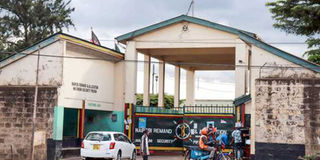Prisons could be a ticking bomb for coronavirus

Nairobi Remand Prison in Industrial Area, Nairobi on May 9, 2020. PHOTO | DENNIS ONSONGO | NATION MEDIA GROUP
What you need to know:
- The government says the two cases are isolated and that it is in control of the situation.
- By Monday, some 7,000 inmates had received their freedom since the government began mass releases last month.
The government is facing the mammoth task of preventing an explosion of the coronavirus in correctional centres three days after the first two infections were reported at Industrial Area Prison in Nairobi.
By their nature, Kenya’s correctional centres have always been a ticking time bomb for communicable diseases, with cholera and typhoid killing dozens of inmates every year.
While the pair who tested positive for the virus during the weekend may seem a minute number, examples across the world show that prisons can easily spread the disease and inmates are vulnerable.
The government says the two cases are isolated and that it is in control of the situation.
PETTY OFFENCES
Part of its strategy has been to release prisoners who are almost completing their terms or are jailed for petty offences.
By Monday, some 7,000 inmates had received their freedom since the government began mass releases last month.
Interior Cabinet Secretary Fred Matiang’i told a Senate ad hoc committee that 213 prisoners and staff had been tested since the two cases were reported. “The 47,000 remaining inmates are healthy and getting their food. There is no cause for alarm,” Dr Matiang’i told the committee chaired by Nairobi Senator Johnson Sakaja.
“We have put stringent measures (in place) to ensure prisons are closed. No one is allowed to visit.”
The CS added that the two Covid-19 positive inmates interacted with 42 other people, who have been moved into isolation and are awaiting testing.
The Nation has established that the two isolation centres with a total bed capacity of 300 are at Industrial Area Remand and Lang’ata Women’s prisons.
The 213 tested are a far cry from the mass testing in prisons promised by Health Cabinet Secretary Mutahi Kagwe, raising questions about the government’s commitment to fighting Covid-19 in these institutions.
REMANDEES
The country’s prison population stands at 219,295, according to the recently released Economic Survey. Of these, only 77,347 are convicted prisoners.
Remandees form the majority of the prison population, at 64 per cent. The remandees are not eligible for early release, as their cases are still pending.
“Some 88.4 per cent of the convicted prisoners are serving sentences of less than two years,” the survey says.
While social distancing and hygiene are being advanced by the government and scientists as the only sure ways of breaking the coronavirus transmission chain, they are non-existent in the country’s 129 prisons.

The World Prison Database shows that Kenya’s official prison system capacity is 26,837 but it has an occupancy of 190 per cent. Such levels of crowding mean the prisons lack basic hygiene products. Social distancing is nearly impossible.
“A block that is supposed to hold 20 people has more than 60. Everyone is disturbed, but we cannot do anything,” an inmate at Kamiti Maximum Security Prison told the Nation.
Two months ago, the government suspended visits to prisons, addition of inmates and prisoner transfers in order to stop the introduction of the virus into the holding system.
But most of the 25,000 prison officers are housed in prisons together with their families and can move in and out.
Should any of the staff or their families pick up the virus elsewhere, it could easily be introduced into a prison, leading to an outbreak.
An attempt by the officer in charge of Industrial Area Remand Prison to stop movement in and out of the centre even by staff failed when the officers protested.
HIGH RISK AREAS
“No person shall be allowed to enter the road gate from outside during the day. No persons shall be allowed to leave the road gate,” said a March 28 memo to staff from Assistant Commissioner of Prisons Stephen Waithaka.
Since Mr Waithaka’s attempt to lock down Kenya’s oldest detention centre, Industrial Area Prison has become ground zero for correctional facility infections.
Health Cabinet Administrative Secretary Rashid Aman yesterday said prisons are high-risk areas that officials are “watching carefully”.
“We are working closely with the Prisons Department and have provided them with personal protective equipment. We have trained them in sampling and will take the necessary measures to ensure there is no spread,” he said.
Across the world, the panic created by the fear of contracting the virus has led to protests, riots and escapes by inmates.
More than 1,500 inmates escaped from a prison in Sao Paulo when the Brazilian government announced a shutdown in prison.
Inmates at a prison in Buenos Aires, Argentina, set fire to mattresses and destroyed a roof in March, demanding to be released on learning that a warder had contacted coronavirus.
Additional reporting by Samwel Owino





